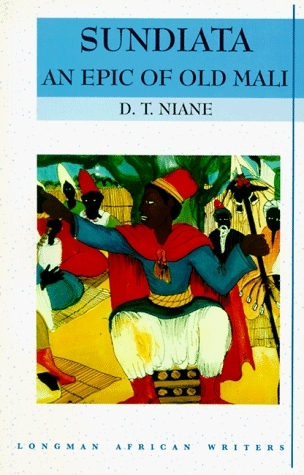Sundiata Book Summary
An Epic of Old Mali
TL;DR
Sundiata: An Epic of Old Mali recounts the legendary story of Sundiata Keita, the founder of the Mali Empire, highlighting themes of community, alliance, and personal growth as he overcomes adversity to unite and strengthen his people.
What is Sundiata about
Sundiata: An Epic of Old Mali is a rich blend of history and legend that narrates the life of Sundiata Keita, who triumphs over physical limitations and familial adversities to establish the Mali Empire in the 13th century. The epic emphasizes the importance of community, collaboration, and personal relationships in the context of empire-building. Translated by Djibril Tamsir Niane from the oral traditions of Mamadou Kouyaté, the story showcases Sundiata's remarkable journey from his humble beginnings marked by disability to his emergence as a formidable leader adept at forming alliances through marriage and diplomacy, ultimately shaping a powerful and prosperous empire.
Sundiata 5 Key Takeaways
The Theme of Disability and Overcoming Adversity
Sundiata's early struggles with physical disability serve as a metaphor for personal and communal challenges. His journey emphasizes resilience and determination, showcasing that one's limitations can be overcome through inner strength and support from loved ones.
The Importance of Community and Alliances
The narrative underlines how Sundiata's ability to forge strong personal relationships contributes to his success. By creating alliances through marriages and diplomacy, he builds a solid foundation for the Mali Empire, demonstrating that individual connections often lead to larger societal achievements.
Cultural Significance of Oral Tradition
As an epic rooted in oral history, the story reflects the significance of storytelling in African culture. It preserves not only the history of the Mali Empire but also conveys moral lessons and values, illustrating the power of narrative in shaping identity.
Leadership and Governance
Sundiata's leadership style, marked by wisdom and empathy, is foundational to his success. He is portrayed as a ruler who prioritizes the well-being of his people, laying the groundwork for governance principles that emphasize justice and collective prosperity.
Historical Context and Legacy
The epic situates Sundiata within the broader context of African history, highlighting his role in establishing the Mali Empire as a major power. His legacy, notably the Manden Charter, is presented as a precursor to modern concepts of human rights and governance.
Top Sundiata Quotes
- The lion’s share of the world belongs to the one who has courage.
- In the end, it is not wealth that measures greatness, but the strength of one's character.
Who should read Sundiata?
This book is ideal for readers interested in African history, folklore, and epic literature. It offers insights into the cultural heritage of Mali while providing lessons on resilience, leadership, and the power of community, making it inspiring for those seeking to understand the dynamics of human relationships and governance.
Sundiata Best Reviews
- A captivating narrative that interweaves history and myth, Sundiata: An Epic of Old Mali is essential for understanding the cultural roots of West Africa. - The New York Times
- Djibril Tamsir Niane's translation brings to life the rich oral traditions of Mali, making Sundiata's journey accessible and engaging for contemporary readers. - BookPage
People also liked these summaries
Sundiata FAQs
What is the main moral lesson of Sundiata?
The main moral lesson of Sundiata emphasizes resilience, the importance of community, and the value of personal relationships in achieving greatness, highlighting that collaboration and support lead to collective success.
How does Sundiata's story reflect African culture?
Sundiata's story reflects African culture through its emphasis on oral tradition, communal values, and the significance of storytelling in preserving history and moral teachings, showcasing a rich heritage that informs identity.
